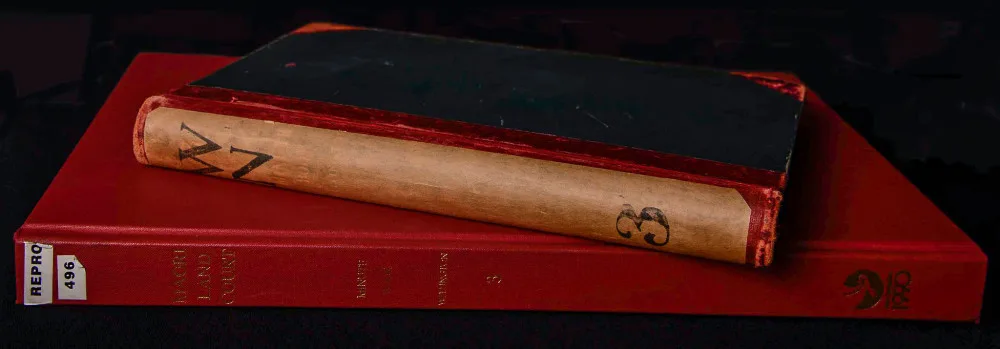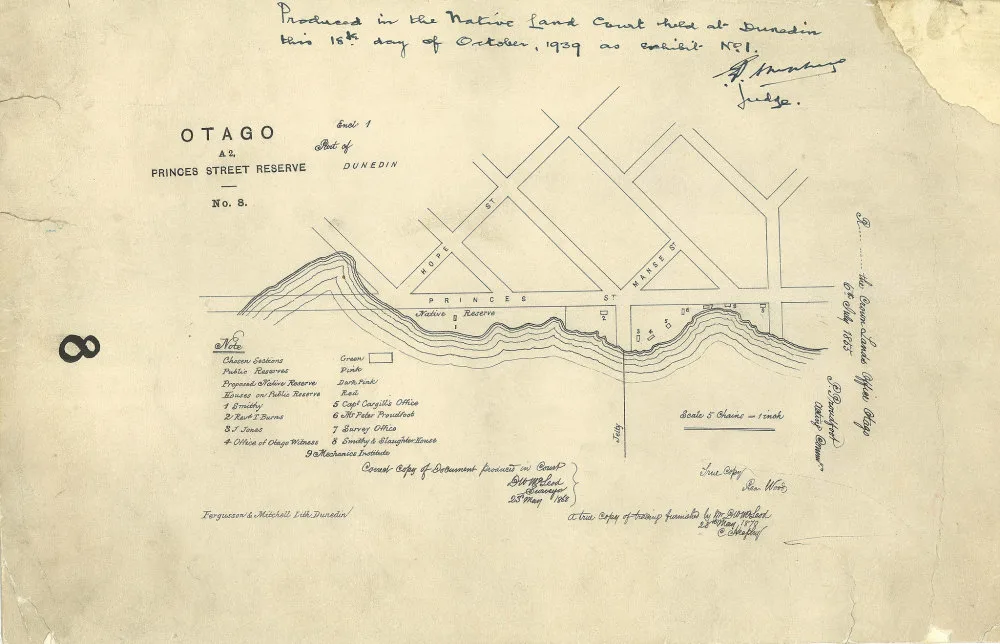
Te Kooti Whenua Māori
Māori Land Court
This research guide refers to records of the Māori Land Court Te Kooti Whenua Māori.
Find tips about researching whakapapa
See our guide to researching Māori land
In 1865 the New Zealand Parliament passed:
An Act to Amend and Consolidate the Laws relating to Lands in the Colony in which the Māori Proprietary Customs still exist and to provide for the ascertainment of the Titles to such lands and for Regulating the Descent thereof and for other purposes - 30th October, 1865
This was `The Native Lands Act 1865’. It set up the Native (later Māori) Land Court of New Zealand, to be the Court of Record for investigation into Māori land titles and succession. A Judge of the Court was to work with at least two assessors and an interpreter.
Any ‘Native’ could claim, in writing, interest in a specified piece of land, and ask the Court to investigate so that a Crown title might be issued. A claimant was to state the name of the iwi or the names of others who had an interest.
News of the application was to be circulated and the Court could summon witnesses, but not all those concerned were at hearings to register an interest.
Under the 1865 Act, up to ten owners only could be registered on a Certificate of Title, but in 1873 this limit was removed.
For every hearing Māori had to pay fees. If they could not pay, charges were placed against the land. Appeals could be made against decisions, but at further cost.
The Court could not make a decision unless an authorised survey of the land had been presented to the Court. The Court could also hear requests to subdivide land blocks. The cost of the survey was borne by Māori.
-
Māori Adoptions and Wills
Although a reference to an adoption or probate may appear in a Minute Book, the actual probate record is held regionally by a Māori Land Court District Office. For more information about Māori and adoption see our Whakapapa search tips guide.
Where a person with an interest in land died without leaving a will to dispose of that interest, the Court could be asked to hear evidence and determine succession, according to law and ‘Native custom’. A Court could process a will for Probate.
-
Court hearings
Sittings of the Court hearings into cases brought to them began in 1865, though most sequences of Minute Books begin somewhat later. They continue today.
A Judge presided at each Court hearing. Some understood te reo Māori; others had interpreters to assist. A Judge sometimes kept his own notes, which have become Judges’ Note Books in the Māori Land Court Minute Book collection. Technically these are not Minute Books, but they add to understanding.
A Judge was assisted by a Clerk, who kept the minutes of the hearing in English. A few Clerks in the 19th century understood te reo Māori; others, like Judges, relied on interpreters. The Clerk created an index of names and block names in a Minute Book.
The Judge was assisted in their work by one or more Assessors, usually Māori, though not from the area of the hearing. They assisted with translation and with understanding the intricacies of Māori whakapapa and connection to the land. A few Assessor Books, in te reo Māori, have survived, where Assessors recorded for themselves what was said in Court. Other Assessor Books are known to be held by descendants.
Māori Land Court Minute Books
We hold copies of Māori Land Court Minute Books from 1865 to 1975 for the whole country. Most files relating to the Minute Books are still held by the Māori Land Court. They can be contacted using the addresses on their website.
Along with information on land, adoptions and probates, these minute books also include whakapapa given by witnesses and successors in order to prove their entitlement to land. Researchers should be aware that evidence was given with a purpose – to hold onto or acquire land – and that it may not be accurate.
There is overlap between districts. Many Waikato-Maniapoto cases were held in Auckland (Taitokerau), and Tauranga minute books are under Waikato-Maniapoto. Some South Island cases were held in the North Island.
Many copies are held, in microfilm some to after 1975 and reproduction forms. Find them in Collections search.
A few items, notably whakapapa and maps, have been separated from their Minute Books for preservation reasons. Most files relating to the Minute Books are still held by the Māori Land Court.
In 2012 the Maori Land Court Minute Books were inscribed on the UNESCO Memory of the World New Zealand Register.
Online index 1865–1910
For searches before 1910, it is easiest to use the Māori Land Court database via public kiosks in the reading rooms. It would be helpful to know the appropriate Māori Land Court district.
An online index for 1865-1910, created by Auckland University, is available online. The database can be searched by name, land block or by hapū or iwi. If searching by a person’s name, it is important to try every possible name the person may have been known by, and every possible spelling of each name.
There is no detailed indexing of Māori Land Court Minute Books after 1910. You will need to know the area and a close date. Our staff can help you find the most likely Minute Books.
Our spreadsheet/index
A spreadsheet of all the Minute Books we hold has been created: a paper copy is available at the reading room desk in Wellington and our staff can access a digital version. This list gives the dates of each Minute Book, the places of hearings and the format versions; whether original, paper reproduction, microfilm or digital.
Separated items
Some Minute Books originally held items such as maps and whakapapa which are larger than the book itself. These are held separately for preservation reasons and are listed with Minute Books in Collections search.
-
![Image of reproduction copy of a Māori Land Court Minute Book lays flat with its spine to the viewer. Resting on top of the reproduction copy at a thirty degree angle is the original version of the Minute Book. Both books are Wellington minute book number 3]() Click to expandMāori Land Court Minute Books - Wellington Minute Book No. 3 original and reproduction copyAAVS W3520 342
Click to expandMāori Land Court Minute Books - Wellington Minute Book No. 3 original and reproduction copyAAVS W3520 342Māori Land Court Minute Books - Wellington Minute Book No. 3 original and reproduction copy used for access
![Image of reproduction copy of a Māori Land Court Minute Book lays flat with its spine to the viewer. Resting on top of the reproduction copy at a thirty degree angle is the original version of the Minute Book. Both books are Wellington minute book number 3]() Click to expandMāori Land Court Minute Books - Wellington Minute Book No. 3 original and reproduction copyAAVS W3520 342
Click to expandMāori Land Court Minute Books - Wellington Minute Book No. 3 original and reproduction copyAAVS W3520 342Māori Land Court Minute Books - Wellington Minute Book No. 3 original and reproduction copy used for access
-
![old map showing street layouts in otago]() Click to expandOtago A.2, Princes Street Reserve No.8 [shows Maori Reserve] 1939DAHG D497/22/e
Click to expandOtago A.2, Princes Street Reserve No.8 [shows Maori Reserve] 1939DAHG D497/22/e![old map showing street layouts in otago]() Click to expandOtago A.2, Princes Street Reserve No.8 [shows Maori Reserve] 1939DAHG D497/22/e
Click to expandOtago A.2, Princes Street Reserve No.8 [shows Maori Reserve] 1939DAHG D497/22/e
Minute Book Holdings
Our Wellington archive holds original Minute Books from all seven Māori Land Court districts. Most date from 1865-1962 or -1975. Originals are not available to researchers, but copies are held on microfilm some to after 1975 and as printed reproductions.
Key sequences are local Minute Books (see below), but others include:
Alienation
Appellate and Consolidation Minute Books
Adoption & Assessors’ Books
Judges’ Note Books
Succession was often recorded in ordinary Minute Books or in Succession Books. Māori-run Block Committees 1900-1905 in Taitokerau & Tairāwhiti, and District Māori Land Boards from 1905 led by Pākehā both created Minute Books.
A few Minute Books are missing, there was sometimes confusion in the numbering, and not all Minute Books are sequential – two might be in use at the same time. Some sequences overlap, notably Ōtorohanga and Waikato. Judges’ Notebooks often cover a variety of places and regions, complementing a number of Minute Books.
Getting copies of Minute Books
We can provide loose-leaf unbound copies of the Minute Books. These are printed off-site and delivered to you, usually taking around three weeks. The cost is determined by the number of pages in each Minute Book – some range from 150 pages to 400 pages, so it can vary. Enquiries about this service, costs and delivery, can be made by filling out the Ask an archivist contact form.
Regional Minute Books Holdings
The main regional groups of records are listed below, but not all the ‘extra’ Minute Books, nor some shorter sequences.
-
Taitokerau
[BAHW W3516]
Auckland 1866-1975
Bay of Islands 1915-1962
Hokianga 1915-1962
Kaipara 1865-1962
Northern 1865-1962
Tokerau 1902-1962
Whangarei 1865-1975
Some Taitokerau Minute Books are held only on microfilm. Reproduction copies of many Minute Books are held in our Auckland archive.
Digital copies of Papatupu Minute Books (Northland) are available online via the University of Auckland.
-
Waikato-Maniapoto
[BACS W3517, W4428, W5308]
Coromandel 1865-1912
Hauraki 1865-1973
Mercer 1886-1965
Otorohanga 1886-1974
Tauranga 1878-1974
Waikato 1866-1974
Includes many Judges’ Books. Please note Otorohanga and Waikato overlap. Some Minute Books are held only on microfilm. Reproduction copies of many Minute Books are held in our Auckland archive.
-
Waiariki
[BAHX W3518, W3746, W4869, W5572]
Maketu 1867-1911
Opotiki 1878-1974
Rotorua 1865-1975
Taupo 1867-1973
Whakatane 1881-1974
Also includes District Māori Land Board books. Some Minute Books are held only on microfilm. Reproduction copies of many Minute Books are held in our Auckland archive.
-
Tairāwhiti
[AAVR W3519, W4864]
Gisborne 1868-1974
Waiapu 1876-1969
Wairoa 1867-1972
Also includes Māori Land Board 1902-1952, Validation Court 1894-1910 and other ‘extras’. A few Gisborne Minute Books are only on microfilm.
Reproduction copies of many Minute Books are held in our Auckland archive.
-
Takitimu
[AAVT W3521, W4865]
Napier 1866-1986
Napier 1986-1998 originals only
Wairarapa 1866-1974
Wairarapa 1976-1998 originals only
A few reproduction versions are held in our Wellington archive.
-
Aotea
[AAVS W3520, W4866]
Assessor 1889-1901
Otaki 1872-1974
Taranaki 1870-1975
Tokaanu 1910-1974
Wanganui 1866-1974
Wellington 1878-1976
Includes some Judges’ Books. Many reproduction versions are held in our Wellington archive.
-
Te Waipounamu
[CAMW W3522]
Chatham Islands 1870-1959
Nelson 1883-1974
South Island 1868-1974
Reproduction copies of many Minute Books are held in our Christchurch archive.
-
Māori Land Court Files
We hold some Māori Land Court files, created as a result of cases recorded in the Minute Books, but many files (such as Block records) are still held by the courts.
Registers of Inwards Letters [AEGV 19100]
Miscellaneous Papers [AEGV 19107]
Maori Land Court Papers [AEGV 19119]
Maori Land Court Plans and Maps [AEGV 19109]
-
Contacting the Māori Land Court
Most files relating to the Minute Books are still held by the Māori Land Court Te Kooti Whenua Māori, including many adoption, will and probate files.
Although a reference to a probate or adoption record may appear in a Minute Book, the actual records are held regionally by a Māori Land Court District Office.
The Māori Land Court in Wellington – Office of the Chief Registrar – doesn’t hold any court records but they can help you identify which office to contact:
Level 7
Fujitsu Tower
141 The Terrace
Wellington Postal address: SX11203 Wellington
Telephone: +64 4 914 3000

